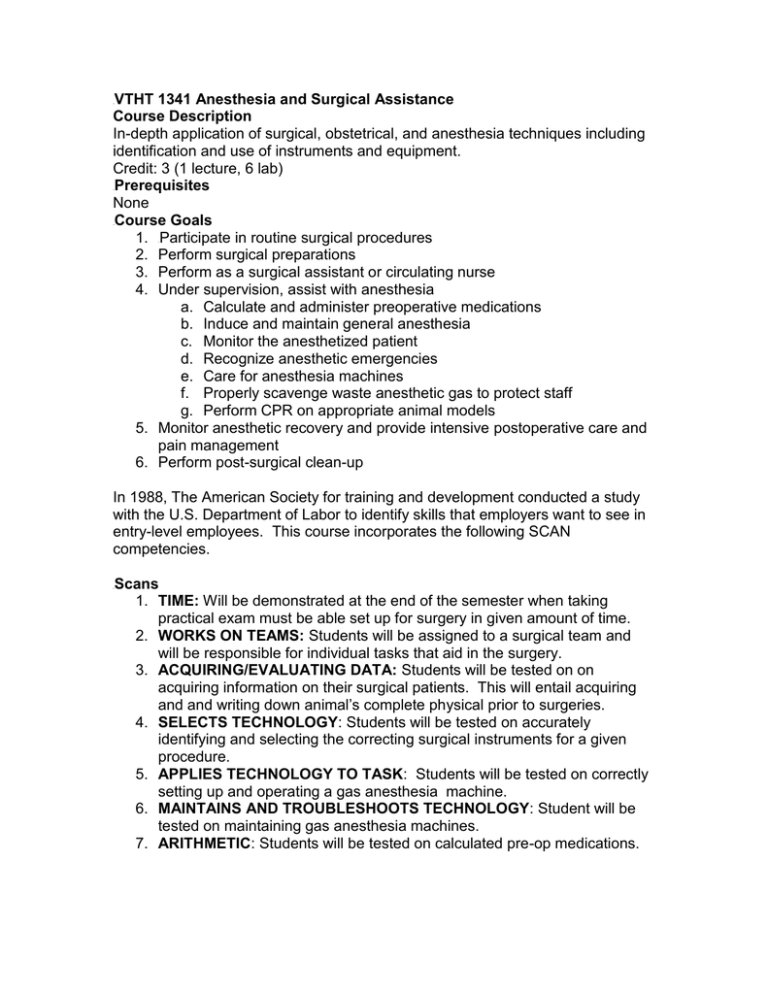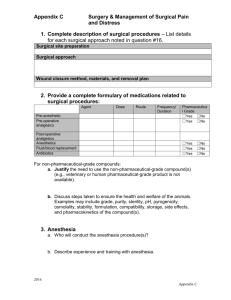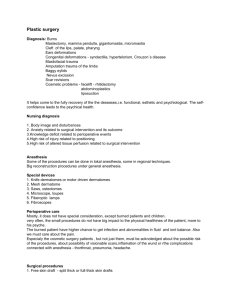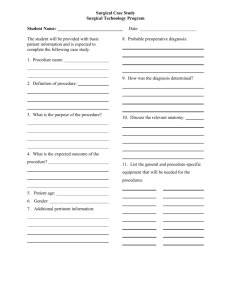VTHT 1341 Anesthesia and Surgical Assistance.doc
advertisement

VTHT 1341 Anesthesia and Surgical Assistance Course Description In-depth application of surgical, obstetrical, and anesthesia techniques including identification and use of instruments and equipment. Credit: 3 (1 lecture, 6 lab) Prerequisites None Course Goals 1. Participate in routine surgical procedures 2. Perform surgical preparations 3. Perform as a surgical assistant or circulating nurse 4. Under supervision, assist with anesthesia a. Calculate and administer preoperative medications b. Induce and maintain general anesthesia c. Monitor the anesthetized patient d. Recognize anesthetic emergencies e. Care for anesthesia machines f. Properly scavenge waste anesthetic gas to protect staff g. Perform CPR on appropriate animal models 5. Monitor anesthetic recovery and provide intensive postoperative care and pain management 6. Perform post-surgical clean-up 0B 1B 2B 3B In 1988, The American Society for training and development conducted a study with the U.S. Department of Labor to identify skills that employers want to see in entry-level employees. This course incorporates the following SCAN competencies. Scans 1. TIME: Will be demonstrated at the end of the semester when taking practical exam must be able set up for surgery in given amount of time. 2. WORKS ON TEAMS: Students will be assigned to a surgical team and will be responsible for individual tasks that aid in the surgery. 3. ACQUIRING/EVALUATING DATA: Students will be tested on on acquiring information on their surgical patients. This will entail acquiring and and writing down animal’s complete physical prior to surgeries. 4. SELECTS TECHNOLOGY: Students will be tested on accurately identifying and selecting the correcting surgical instruments for a given procedure. 5. APPLIES TECHNOLOGY TO TASK: Students will be tested on correctly setting up and operating a gas anesthesia machine. 6. MAINTAINS AND TROUBLESHOOTS TECHNOLOGY: Student will be tested on maintaining gas anesthesia machines. 7. ARITHMETIC: Students will be tested on calculated pre-op medications. 4B 8. PROBLEM SOLVING: Students will demonstrate ability to solve problems by oral exam—giving certain critical scenarios that may happen during a surgery. 9. REPONSIBILITY: Students must be responsible as exhibiting by being on time for surgical class dates. Students will not be allowed in class if more than 10 minutes late on said dates. 10. INTEGRITY: Students will exhibit individual integrity by not cheating on exams. Not complying will result in dismissal from class. Instructor Information Felicia Hill, 713-718-5519, Room 340, email Felicia.hill@hccs.edu Assistant Roger Zinn, 713 718-5519, Room 340 Textbook Information Principals and Practice of Veterinary Technology by Paul Pratt Lab Requirements No lab. This is an actual hands-on clinical course. Students with Disabilities Any student with a documented disability (e.g. physical, learning, psychiatric, vision, hearing, etc.) who needs to arrange reasonable accommodations must contact the Disability Services Office at the respective College at the beginning of each semester. Faculty are authorized to provide only the accommodations requested by the Disability Support Services Office." Students will need to contact the Northwest ADA office at 713-718-5708. Academic Honesty See College Student handbook Attendance and Withdrawal Policies Students who are absent for more than 3 class periods may be administratively withdrawn from the course without notification. It is the responsibility of the student to withdraw officially from a course. Administrative drops are at the discretion of the instructor. Failure of a student to withdraw officially could result in the student receiving a grade of “F” in the course. Course Requirements and Grading Policy Attendance grade is 10% Homework: 20% Quizzes: 20% Exams: 25% Final: 25% Total: 100% In order to pass the course, you must pass the practical final with a grade of 70% or more. Testing See above Projects, Assignments, Portfolios, Service Learning, Internships, etc. No special projects or assignments other than what is required in the course content 5B HU 6B 7B 8B 9B 10B 11B 12B U Course Content: 1. History and Physical exam 2. Surgical Preparation a. Blood withdrawal b. Catheters c. Fluid therapy d. Aseptic technique e. Intubation 3. Surgical Assistance a. Instrument identification b. Anesthesia c. Dentistry d. Monitoring Equipment e. Thermoregulation f. Surgical room preparation 4. Post-operative monitoring 5. Clean up a. Preparation of surgical packs and gowns b. Equipment maintenance Other Student Information All students enrolled in the Veterinary Paramedic Program will be provided with a special code for access to their personal Eagle Online account. 13B 14B 15B EGLS3—Evaluation for Greater Learning Student Survey System At Houston community College, professors believe that thoughtful student feedback is necessary to improve teaching and learning. During a designated time, you will be asked to answer a sort online survey of research-based questions related to instruction. The anonymous results of the survey will be made available to your professors and division chairs for continual improvement of instruction. Look for the survey as part of the Houston Community College Student System online near the end of the term.




